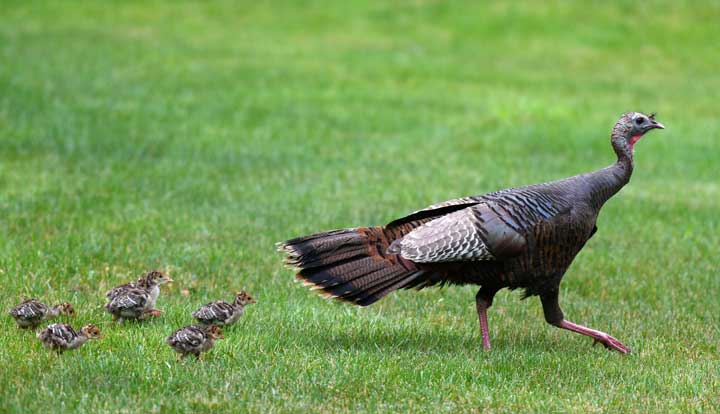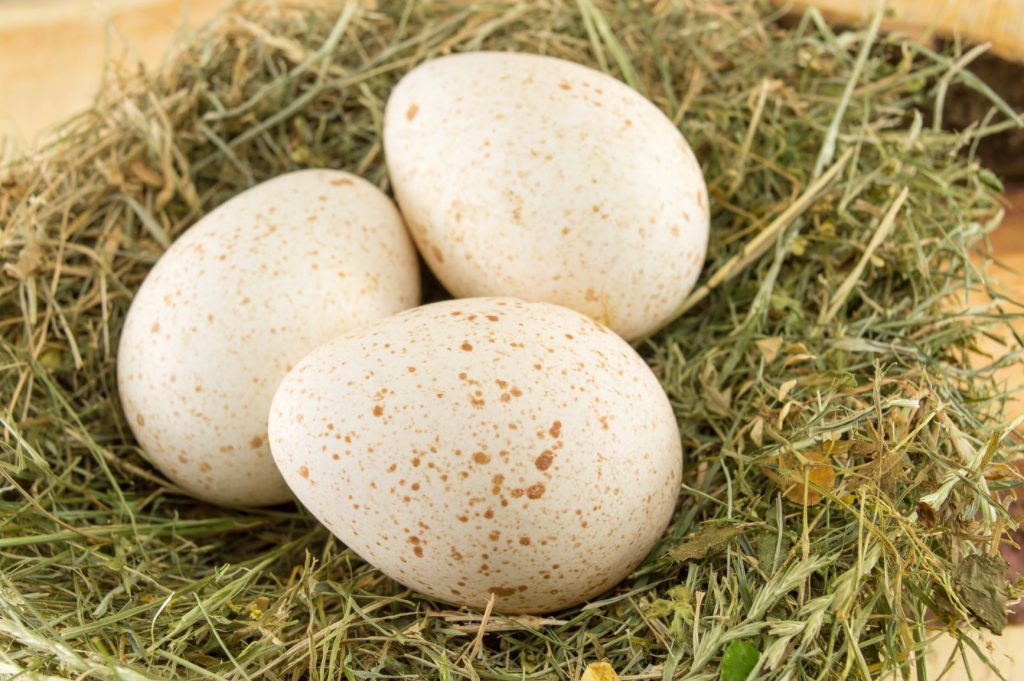While you can eat turkey eggs, I don’t recommend it (and neither do wildlife experts). Although eggs from nearly any type of bird can offer life-saving nutrients in extreme cases, there are some eggs you shouldn’t plan on eating while out in nature.
Here’s what you need to know about eating turkey eggs, and why I don’t recommend it.
Why Shouldn’t You Eat Turkey Eggs?
The short answer is that each time you consume a turkey egg, you could be impacting the turkey population. Even if you’re out in the wilderness and are coming up short at dinner time, you should avoid snacking from turkeys’ nests for these reasons.

Declining Turkey Population
The first reason you should avoid eating turkey eggs is that the population is in a slow decline, according to Georgia’s Summer Poult Survey. I know that I’ve been seeing fewer birds around these days, and there are a few reasons for it.
Between the ’70s and ’90s, the average hen had between three and four and a half poults. With an average of just 1.4 poults per hen in 2020, Georgia is losing its turkey population.
In 2020, we also saw record harvest numbers that are still affecting the turkey population this year. Plus, once a hen has laid its clutch, there’s only around a 30% chance of the eggs hatching successfully. There’s an even slimmer chance of the entire brood surviving a month.
Even a single egg can make a difference, so keeping the nests as full as possible is the best choice. Plus, more eggs in the nest likely mean more turkeys to hunt next season.
Native Americans Respected Turkeys
Another reason for skipping turkey eggs? It’s not human nature to eat the wild bird’s eggs.
Archaeologists have found evidence of eggshells close to the dinner pits of pre-Columbian Americans. That means hunter-gatherers have been consuming eggs for a long time.
And many Native American tribes would also embrace the turkey as a part of their diet. However, they were always careful to respect local turkey populations with their hunting practices.
Native Americans revered turkeys, hunting them not only for their meat but also using their bones and feathers. Few tribes ate turkey, and those that did, did so sparingly.
Turkey eggs were an even rarer delicacy because there was an understanding of the need to conserve nature. Modern humans may look to all birds as sources of sustenance, but Native people didn’t.
If you’re hoping to live a bit closer to nature, choosing alternate food sources while out in the forest is a good first step.

Conserving Turkey Populations
We all need to do our part to help preserve America’s native turkey population. If we aren’t careful, we could end up hunting the bird to endangered status, or even drive it to extinction. That’s because other factors, like predation and weather, also contribute to lower turkey populations.
In the springtime, most jurisdictions only allow hunters to bag toms and jakes when they’re out calling turkeys. This is to ensure that you leave enough females to lay their eggs and perpetuate the population.
Turkeys take a while to develop, and once they do, they lay a limited number of eggs. Their mating season is also limited to springtime when longer days drive reproductive hormones to ramp up their efforts.
Turkey eggs are, in short, the future of the species. Being aware and intentional with our hunting and egg-consuming practices is one way that nature enthusiasts can help protect turkeys while still enjoying the hunt.
What Do Turkey Eggs Look Like?
If you’ve ever trekked through turkey territory during hatching season, you may have stumbled across a clutch of turkey eggs. Even though they can fly (not to mention run pretty fast before they take off), turkeys craft their nest on the ground, which can make them difficult to spot.
If you’re not sure whether the clutch you’ve found is turkey eggs, take a close look at the size and coloration. Turkey eggs tend to be an off-white hue with dark speckles, and they’re usually about 50% larger than your average chicken egg.
Turkey eggs won’t always come fertilized. A mature hen needs access to a Tom for eggs to be viable. Jakes don’t produce sperm, and thus, can’t father healthy eggs for hatching.
But it’s impossible to tell a fertilized egg from its appearance. It’s always best to treat all eggs as a future poult.

Is It Ever Okay to Eat Turkey Eggs?
You might be thinking, sure, let’s avoid eating turkey eggs so that next hunting season will be better (and turkeys will stick around). But is there ever a time when it’s okay to consume eggs from a turkey?
You’ll have to make the decision based on your circumstances, but I don’t recommend eating turkey eggs unless you are in serious danger. That doesn’t mean grabbing an egg after you’ve gone a day or two without eating. Fasting periods of 24-48 hours are often considered safe, even if you’re feeling extreme hunger.
Personally, I wouldn’t take from a turkey nest unless I knew there were no other food sources available and was experiencing an emergency. After all, the odds of the nest producing even a single poult that lives beyond its first month is only 7 percent.
By taking even one egg, you’re lowering those odds exponentially. Plus, the more poults the hen has at one time, the higher the odds at least one (or more) can escape predators when they come lurking. A fuller nest is a healthier nest!
Bottom Line?
While hunting turkeys is still widely accepted even as populations decline, there are rules in place to protect wild turkeys. One of those unspoken rules is to avoid disturbing turkey nests, even if you’re really hungry. Unless your life is in danger, it’s best to let nature take its course and give the potential poults the best chance at surviving.




